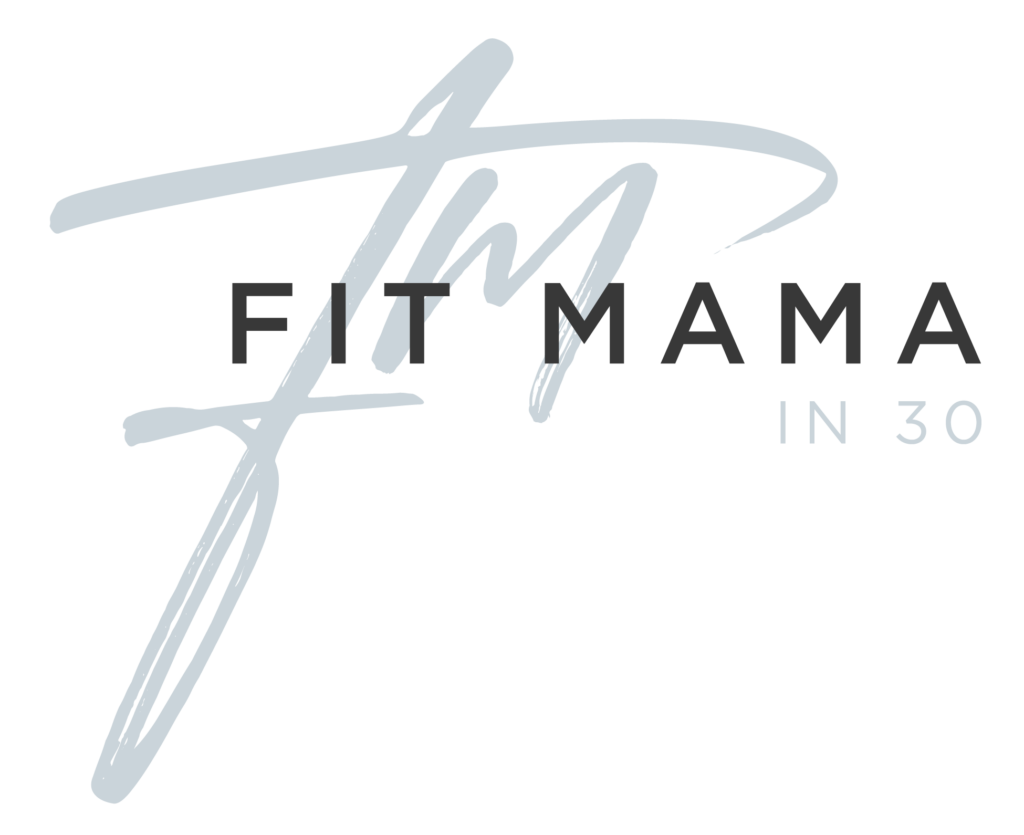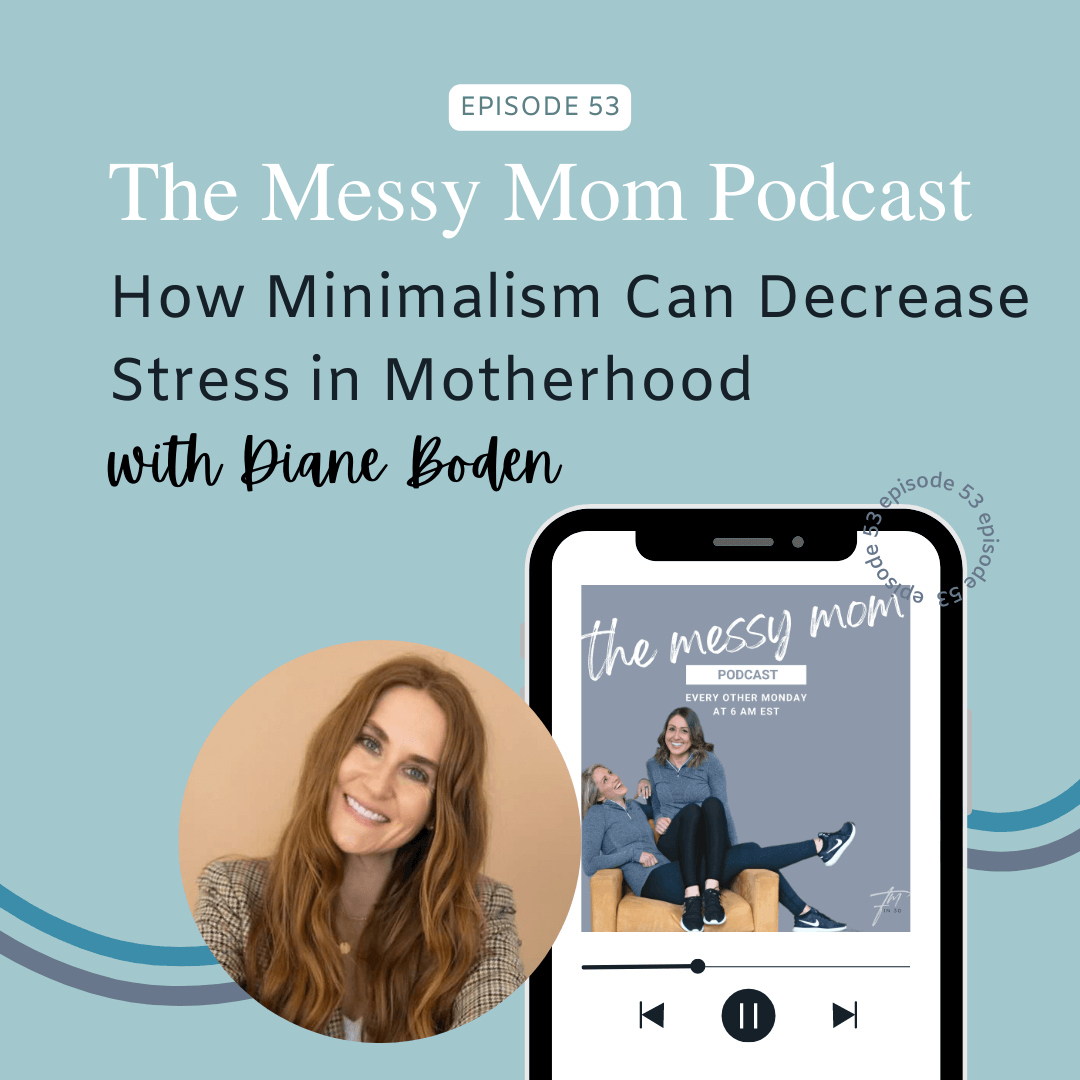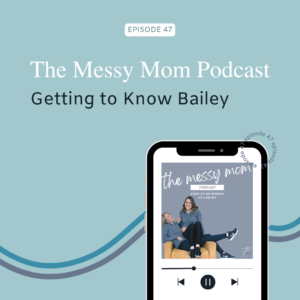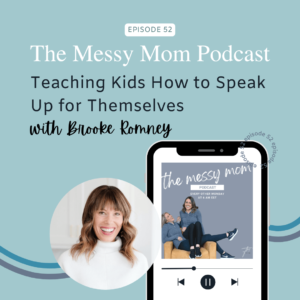CLICK PLAY TO LISTEN TO HOW MINIMALISM CAN DECREASE STRESS IN MOTHERHOOD:
How Minimalism Can Decrease Stress in Motherhood
Welcome to another episode of our podcast! Today, we’ve got a fantastic guest lined up. But before we dive into the conversation, we need to address, as Cari’s son Carter likes to put it, “the elephant in the room.” And if you haven’t already heard the news, Bailey is PREGNANT! She has wanted to say it forever but the timing wasn’t right until now and we’re thrilled to finally share it with you!
Now, for the question you may be wondering: Is Crew getting a baby brother or sister? Drum roll, please… It’s a boy!! Yes, another boy to join Bailey’s household. Looks like Bailey will be outnumbered by the boys, but luckily she has her dog Lucy.
With that exciting news out of the way, let’s get into today’s episode. Our guest this time is Diane Boden, whom some of you may remember from when we were on her podcast a few years ago. Diane resides in Columbus, Ohio, with her husband, three kids, and two dogs. She’s the host of the Minimalist Moms podcast and the author of the book with the same title, “Minimalist Moms: Living and Parenting with Simplicity.” On top of that, Diane enjoys photography. She loves capturing her children’s moments and does photography work in Columbus. Simultaneously, she takes on the role of homeschooling her daughter, while her two sons are enrolled in school. Should you ask about her core values, she would say being with family, nature and finding time to be creative.
We’ve invited Diane on to discuss the incredible power of minimalism in reducing stress, especially in the realm of motherhood, and how it can lead to a more stress-free life overall. Join us as we explore Diane’s insightful advice on where to begin your minimalist journey, how to declutter your physical space, minimize your mindset, how you’re spending your time, and much more.
Diane’s Minimalistic Journey
Jumping right into the first question on what overall caused Diane to get started on her minimalistic journey/lifestyle?
If you’ve had the chance to hear Diane on a podcast before, you might have heard this already. But Diane started her minimalist pursuits back in her early 20s. She would say at that point in time, she was the opposite of a minimalist. She wanted new clothes and she never wanted anyone to see her in the same thing. It was something that she felt really good about. Obviously, you have the same outfit, but you wear it to different places. Yet, she still had this abundance of clothing in her wardrobe. She was in a lot of debt at the time, and she just felt like she wanted whatever was brand new, the latest thing. Looking back, this drive likely stemmed from insecurities and a tendency to compare herself to others, assuming she needed these things to be accepted or valuable.
Fast-forward to her meeting her husband; they didn’t immediately discuss minimalism, but he existed with a focus on essentials. At one point they were in her parents’ basement looking for something, and he looked at her and said, “Look at these things that are now in boxes that were once your dad’s hard-earned working hours.” And for some reason, she never correlated all of her hard-earned working hours with the things. You work and then you have things, but there was some type of disconnect. But it became clear – she didn’t want to be working for things that would eventually end up in a basement or storage unit. She wanted to focus her money and energy on getting the experiences.
Diane emphasizes that her intent isn’t to criticize her upbringing or parents as her childhood was idyllic. But she thinks keeping even the basic physical clutter of items stored in a basement was something she didn’t want. It was a light bulb moment for her to where she was like “Okay, I don’t need the things because I don’t want the things to one day weigh me down. So, let’s start working towards these values.”
Letting Go of Sentimental Items
This leads right into the next point as this was something that Cari just did, she cleaned out the unfinished space of her basement. She had all of these boxes with amazing awards and things you get from your parents that they think are going to be cool but it takes up massive amounts of space. It’s great but what purpose do they serve? Trophies from childhood gymnastics, for instance from when she was 7, hold sentimental value, yet they’ve remained untouched for years. It’s a realization that at the end of the day, if it’s something important take a picture and move on with it.
Diane adds it’s because of that sentimental attachment to her as a seven-year-old gymnast that her parents, don’t wanna get rid of. They don’t wanna get rid of how they feel about watching her do that. So she understands the heaviness that is attached to this item, that again, this item is a representation of all of that experience that they have. But getting rid of things doesn’t get rid of that feeling or that emotion. And she thinks that’s why it’s so hard to declutter because we do get so tied up in the emotions and the feelings of our things. She herself is still there with certain items in her home, like baby items or all the medals from races that she’s run because she never thought she would be a runner. So to her, they’re really valuable. Yet at some point, once she’s gone someone’s most likely going to throw that box away. But for now, she enjoys keeping that box.
Bailey shares a similar perspective and her son is only two. Last Sunday he went to church and made these crafts. She decided she’d put 1 on the fridge and get rid of the other 2. But she felt really bad and guilty about it even though she doesn’t want all that stuff.
Diane highlights what Bailey is saying in acknowledging the necessity of rationality. To go back to what we actually know. The truth is, we can’t hold onto everything. And what Bailey knows is a simple statement of “I can’t keep it all”. So that means you have to make a choice. Like Cari said, you could take a picture of it and that’s a great way to save some of these things that are more special to us like artwork. As for baby clothes, passing them down to friends or family members gives them a second life and can help create a healthy detachment over time. Diane compares this to exposure therapy, where the more you expose yourself the less strong the attachment becomes. So, time is helpful but she wouldn’t use that as a crutch.
Minimalism Decreases Stress in Motherhood
Next up, Bailey asks Diane if she thinks being a minimalist has helped reduce stress in motherhood.
Diane absolutely thinks that embracing this mentality has helped her. She points out that we have to remember that everything we own is something we have to keep track of. People will call it your home inventory. So when you have gone through and decluttered your house, you’re not managing as much stuff.
And the stuff really does weigh you down. Diane shares an example: Envision entering your home’s entryway, on days when it’s cluttered, chaotic and not tidied. You just feel that weight when you go into your house and that’s not something she wants to experience when existing in her space. It’s something that she wants to get control of so that her home can be a refuge.
She always says, “You can’t control other people or things that go on in the world, but you can control the tangible items of your home. You and your spouse are the gatekeepers. So, you guys can get that under control because it’s something that you can tangibly get rid of or decide to keep.” But there are other things that are out of our control. So for her, being somewhat of a control freak, she likes that she can get her hands on this and make those choices.
Cari agrees. She also adds that even having the smallest rule in place can make a big difference. For instance, Cari’s kids love to come off the bus stop and scramble the neighborhood. Which she loves, except for when they come in the door and throw all of their stuff at the foot because then with two kids that’s two backpacks and a couple of stuff can throw everything off. So, by enforcing a simple rule — placing backpacks on the designated hook then you can go scatter the neighborhood — it can change the whole mindset and attitude by that one thing.
Diane is right there with her and adds to imagine then if the whole house was that way. So, start slow if needed and build momentum throughout the house. Note, in regard to that sentimentality and emotional pull, to start in places that don’t have that feeling attached to them. For example, like the bathroom because there are few things in there that you’re typically attached to sentimentally. You also typically start and end your day in the bathroom so it’s not a weight or a reminder that “Oh my gosh, even my bathroom is chaotic. My house is chaotic. I need to get it under control.” She thinks that that is a great place to start and give yourself that little momentum that you need to move through the rest of your space.
Bailey couldn’t agree more. She recently has been revisiting things and a lot of her walls are bare. So, sometimes she feels this need or pull to put something on every bare wall. But then she’s realized that that just feels constricting. It’s okay to keep a wall bare, clean, and minimal. You don’t have to clean around it and all these different things. Sometimes less stuff overall makes you feel lighter. Diane adds that this is similar to how people feel in hotel rooms or vacation spaces because they aren’t cluttered and overwhelmed with things. She thinks that’s kind of a nice thing about going to those spaces that we may not even recognize.
What Brings the Most Joy Being a Minimalist
With adapting to this minimalist lifestyle, Bailey was curious about the most rewarding aspects and improvements this lifestyle shift has brought to Diane’s life.
Diane starts with the tangible things. Having decluttered her spaces makes it much easier to manage her household, which in turn means she can spend more time away from her house because she knows that when she returns home, she doesn’t have an abundance of things to take care of. So, she would say fewer things equal they can go out and she doesn’t have that weight of, “Oh gosh, I have to return home and clean.” She doesn’t have to spend hours cleaning. Not only that, but as she said at the beginning, she loves being in nature and she doesn’t feel like she could be as at peace or relaxed knowing that she had a tornado to come home to.
However, she thinks the more that she pursued, not even a minimalist lifestyle, but a more intentional, thought-out lifestyle, the more benefits it has had for her mind and mindset regarding things as well as where she wants to direct her energy and attention. For so long, as a people pleaser, she was saying yes to everything. Gradually, this led to feelings of resentment, trapped in a cycle of agreeing without being able to say no. However, as she got really clear, outside of the tangible things like her values, she was able to take the time to sit down and think about what she really wanted. She went through and said, “What do I want to say yes to on our schedule?” Getting really clear about how she wants to spend her time has also been this unexpected benefit to living with fewer things.
It’s been a process, and she’s still trying to figure it all out. But she would say it’s so much more than just the stuff. It really does have to do with every facet of our life.
Where To Start
This brings us to our next question for someone starting out on this journey. As Diane mentioned, beyond addressing the bathroom space, does she recommend starting with physical things? Is that the most straightforward approach to decluttering the mind, or does she suggest someone doing what she just talked about —taking a seat and mapping out where they are spending their time? Which is the easiest way to start to minimize your life?
She doesn’t know because, in her own experience, she didn’t start to get into the mindset element until she had already done the work at home. But again, because she doesn’t have a ton of stuff to do or clean up she can pretty much go through and tidy her house in 15 minutes. And she thinks that has given her the margin to sit down and do more of the deep work with her mindset and brain. But she also thinks as with anything, you’re never going to arrive. It’s never going to be perfect. And so, even with the clarity or just the awareness that we have with our values and where we’re spending our time as a family, it’s still something that she has to constantly come back to because as kids get older, they have their own autonomy, and they have their own relationships or interests that they want to maintain.
So, she would say start with the things to give you that piece. But if you are an early riser or have time after your kids go to bed. Sit down and write a list of the things that you value versus the things that you’ve been making a priority in your life. Then compare the lists and start to chip away at what differences you want to make. For instance, if you’re saying you prioritize your family, but you have been spending a ton of time on Instagram or you have been working out too much, and your time isn’t matching up, changes need to be made.
Fighting the Urge
When first getting started, how did Diane fight the urge to want to go out and buy more when she’s already made the choice that she wanted to adopt this lifestyle? Because Bailey feels a lot of people probably struggle here especially now with social media and being constantly bombarded with ads and influencers. We all get that urge sometimes when we see something and think, “I want that”. How did she fight that or how does she recommend people fight that urge?
For Diane, when she first started back after that basement moment, she honestly just had to stay away from stores and she couldn’t go to the mall. Then she started to detach from it. She began wondering, “Why do people do this for leisure? Why are people just going to the mall or these outdoor malls for fun?” She just felt like there were better things that we could be doing with our time. She deleted all of the emails that she would get and used an unsubscribe website called unroll.me. That was really helpful because she wouldn’t see it automatically.
With Instagram, she has noticed the past 6-9 months with the algorithm she is not necessarily interested in shopping but it knows what she wants if she were to go shopping. So, if there is something she’s ruminating on, because that’s a tendency of hers, she will say, “Okay, if in a month you still want this thing, then maybe pull the trigger.” Sometimes we think we need something when it’s actually just a want. And so again, detachment will help us actually get the awareness of what we need.
It is something we actually have to do, we have to fight it and we have to put these boundaries into place of how we’re going to manage it. Because if you don’t have a plan, then you, just end up having a ton of packages always showing up to your house. So, doing that self-assessment, knowing yourself, and having that margin to do so is really important. Diane understands that as moms, especially if you have multiple children, you don’t get as much time. But doing that even just taking one afternoon to process some things, write a bunch of things down and just see where you feel like you are not living up to what you really want in this life can make a difference.
You are in control of certain things that you are doing. Again, we’re not in control of others, but if there is something that you could do by getting up earlier, going to bed later or saying, “I’m going to turn off these notifications. I’m going to sign up for unroll.me. Every time I go into Target, I’m not going to walk by this one section.” Writing those things down. And then they become second nature. It sounds like a lot of work, but none of this is work for her anymore because she’s already made the decision. She doesn’t have to think about that anymore. She knows where they spend their money. She knows where she wants to spend her time. It’s really good to take the time to do all of this self-help work.
We want to thank Diane so much for coming on and discussing this with us. Her final piece of advice is that she thinks so often we compare ourselves to others or what other moms are doing that we need to remember the phrase “Stay in your lane”. It’s a reminder to focus on what you are doing with your kids, what you are doing as a family and not looking to anyone else because we don’t know what each other’s time looks like. We don’t know what each other’s schedules look like and when we start to compare, it can obscure the fact that our strengths and capabilities vary. So just get honest with yourself to say, “What is my strength? I’m doing that well. I might be not doing this well, but that’s okay.” And celebrate that or also just stay in your lane. This is only the beginning of our conversation on how minimalism can decrease stress in motherhood. Listen to the full episode wherever you listen to your podcasts.
Resources mentioned:
- Unroll.me
- Connect with Diane:
- Connect with Fit Mama in 30
- Find us over on Instagram @fitmamain30
- Are you looking for a fitness program but having a hard time finding one that adjusts with you through the seasons of motherhood? Try any of our Fit Mama in 30 guided programs completely free for seven days. And if you decide you want to stick with us after the seven days, you can get $10 off your membership with the code PODCAST at checkout.





